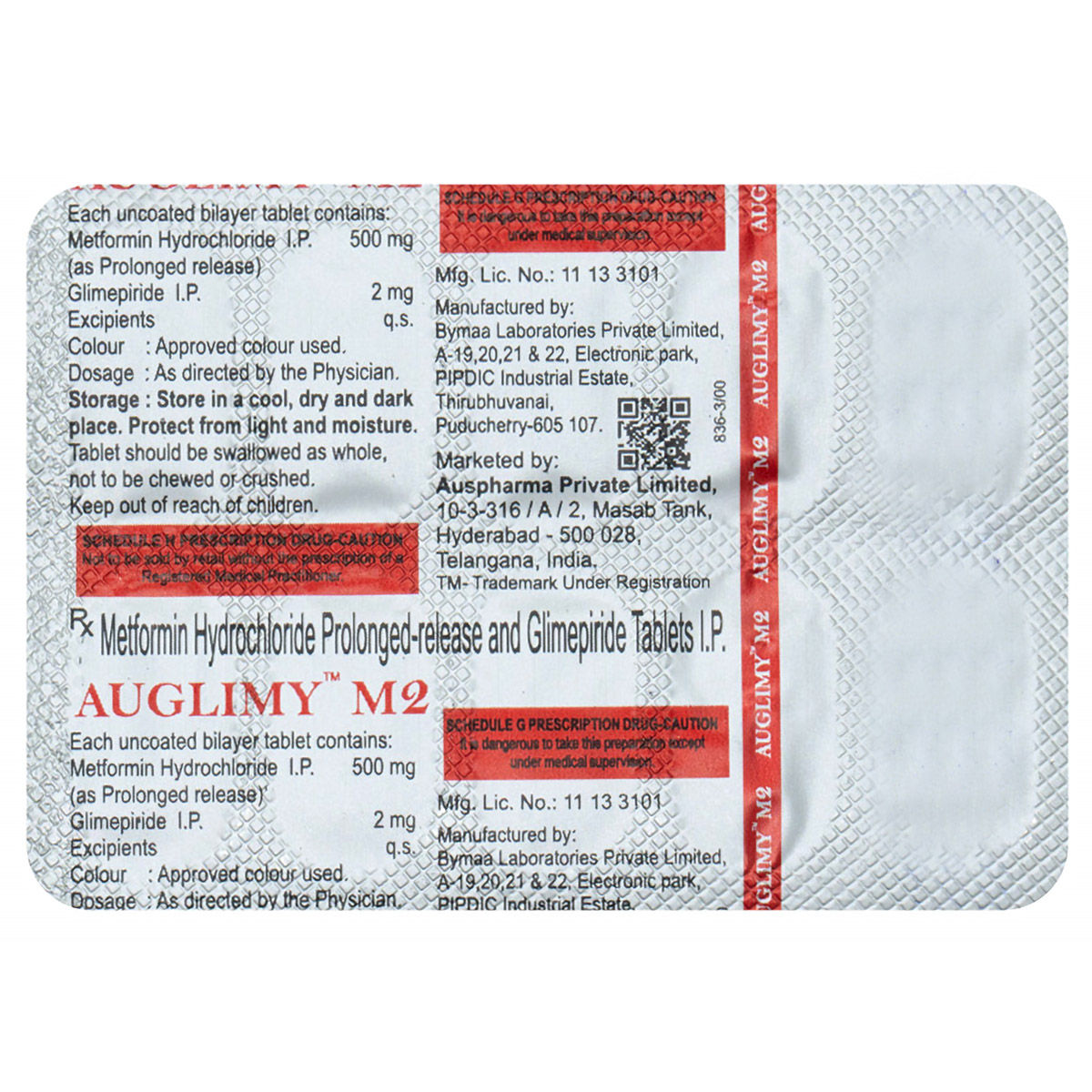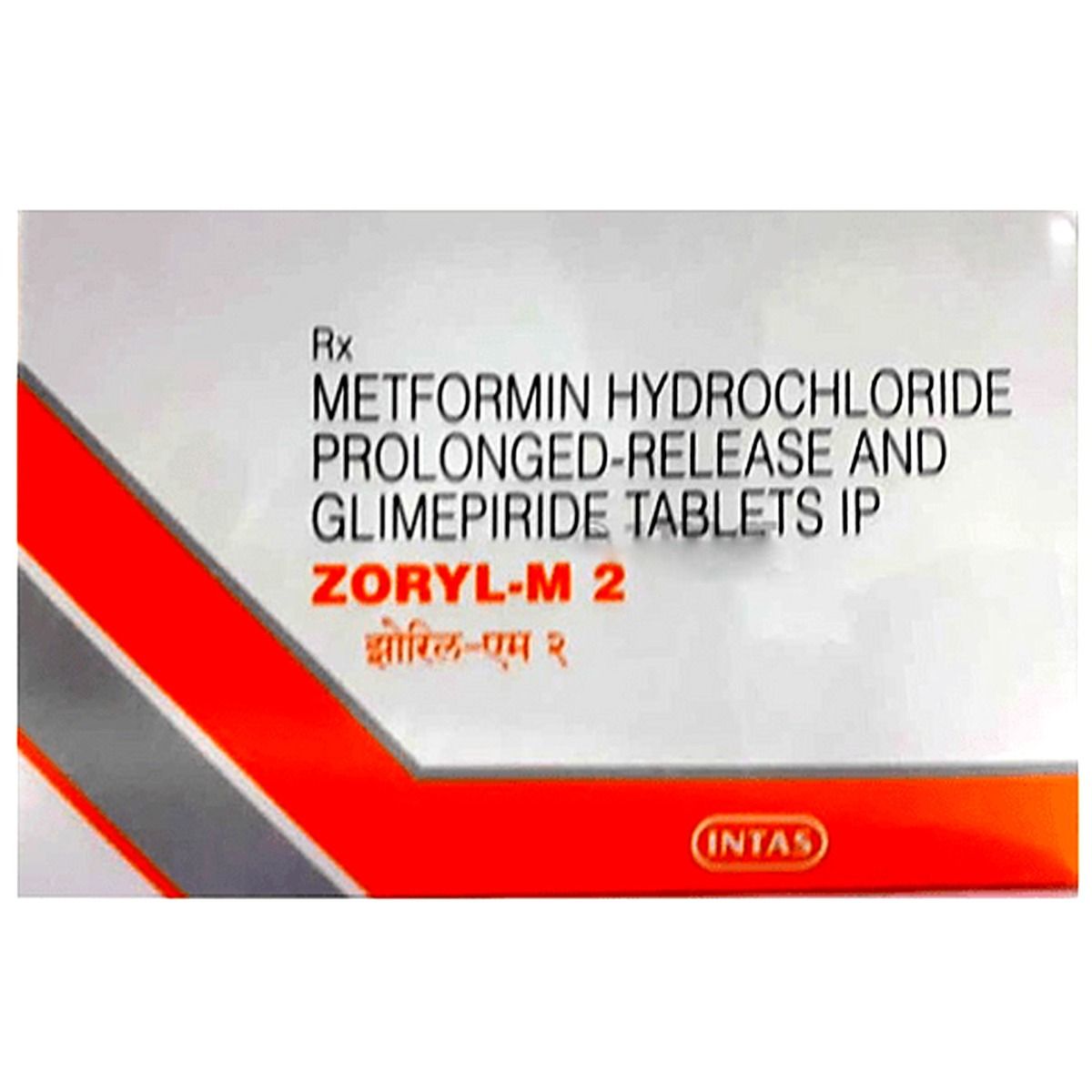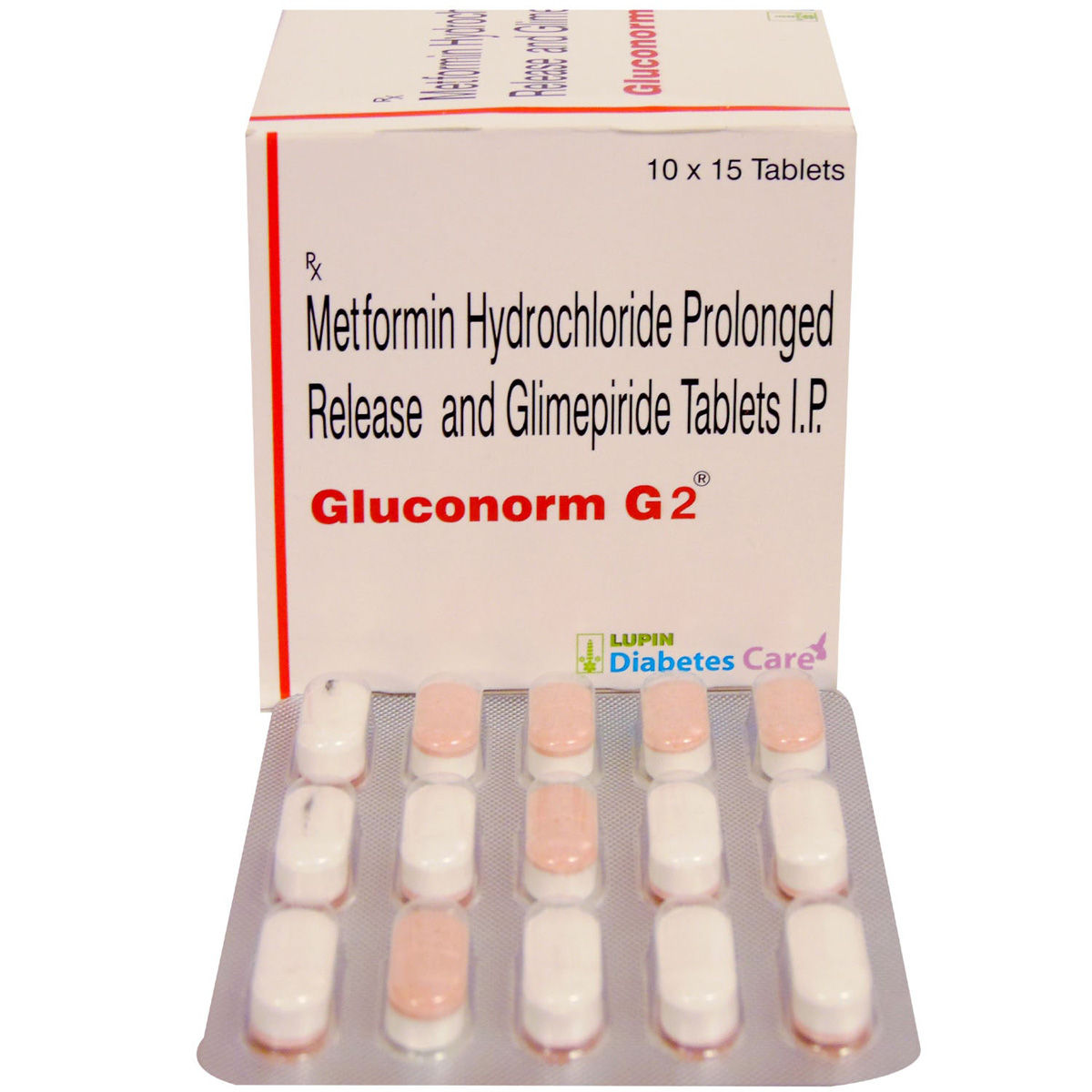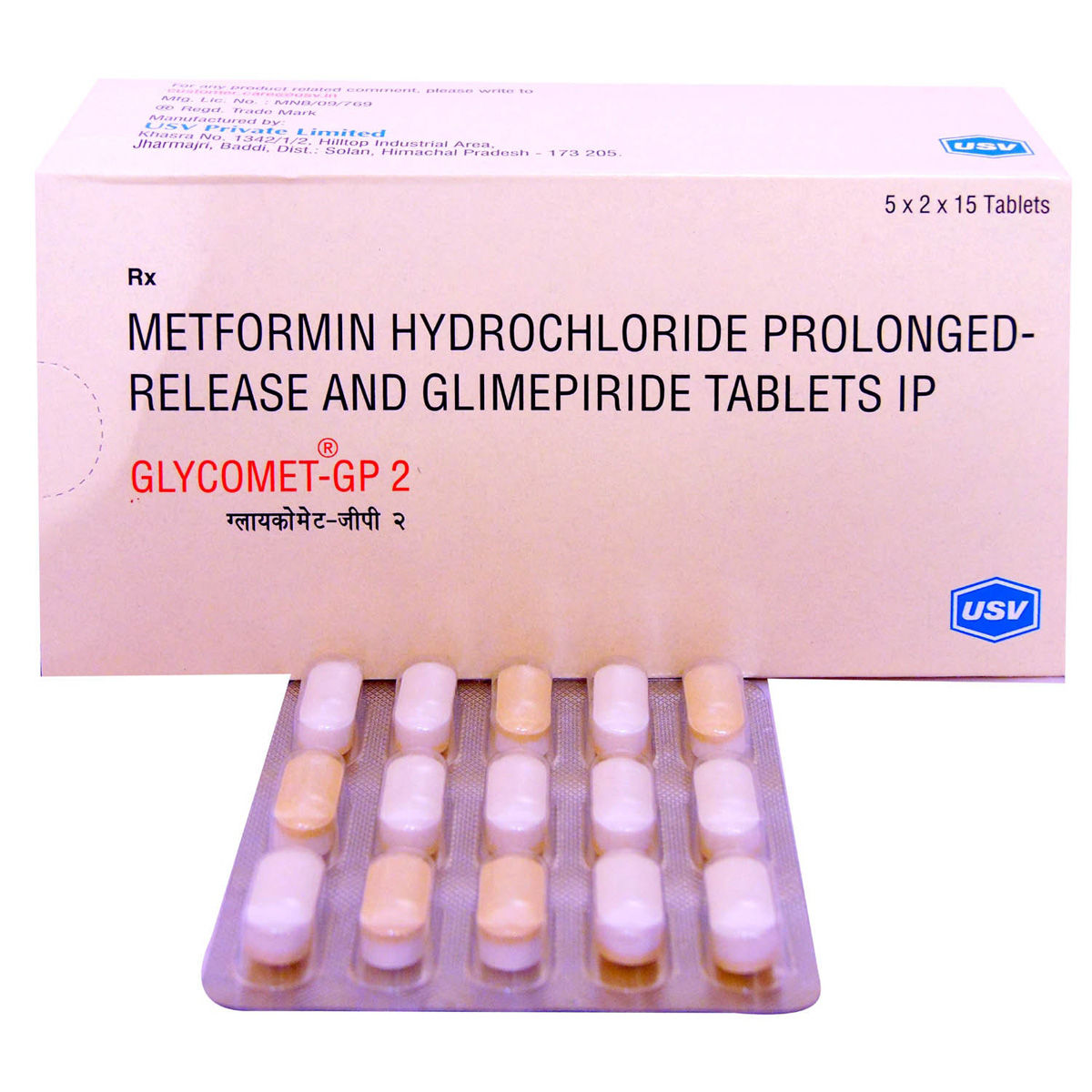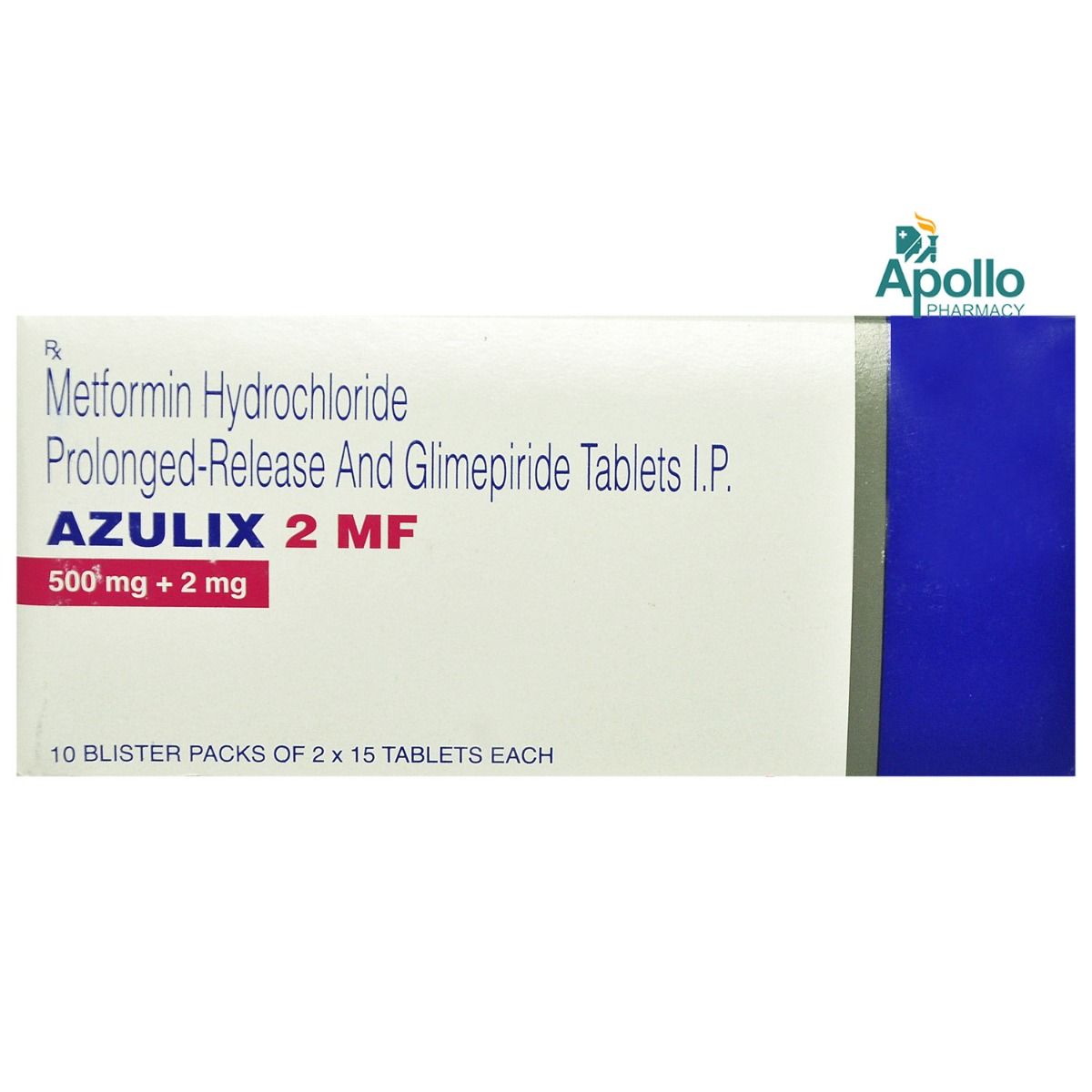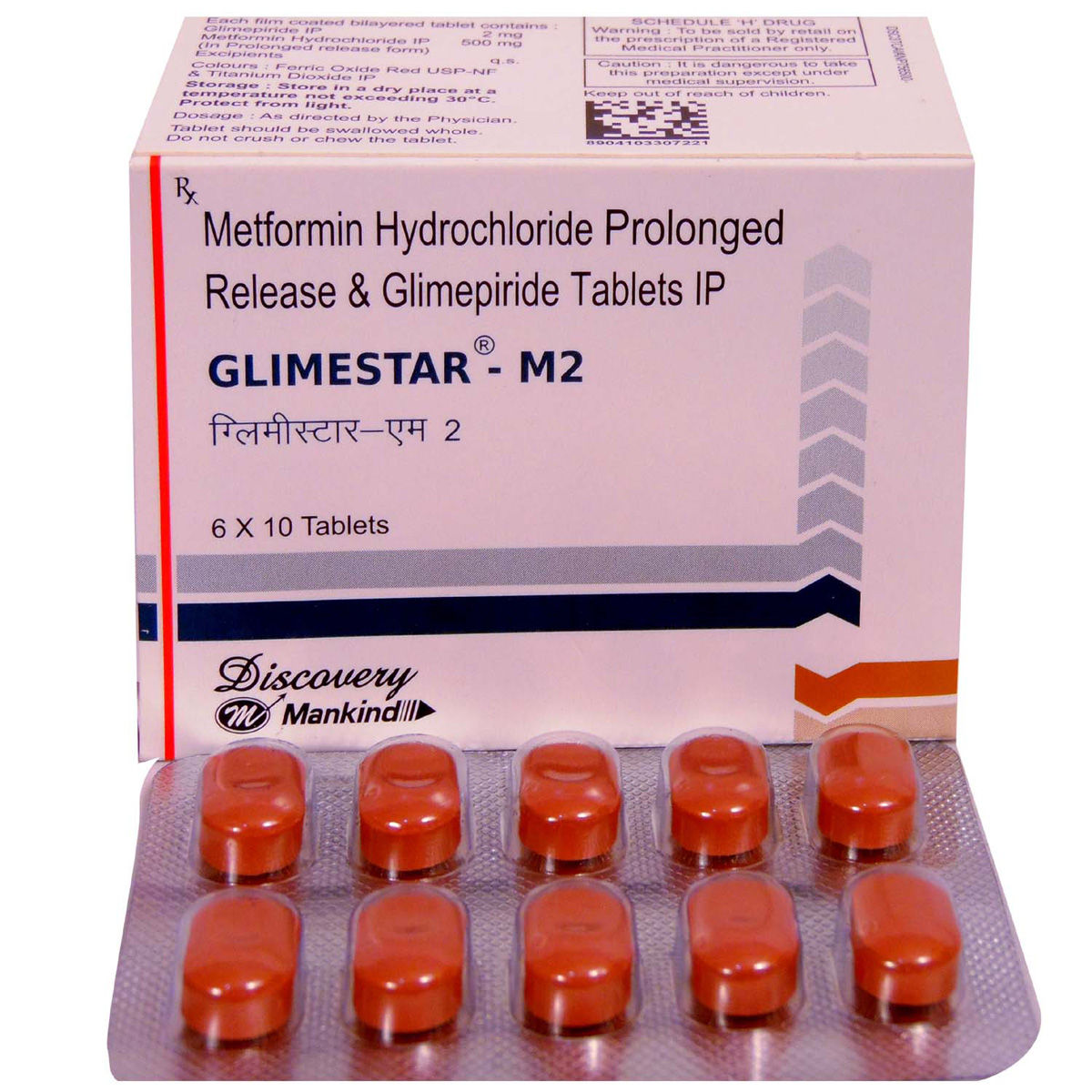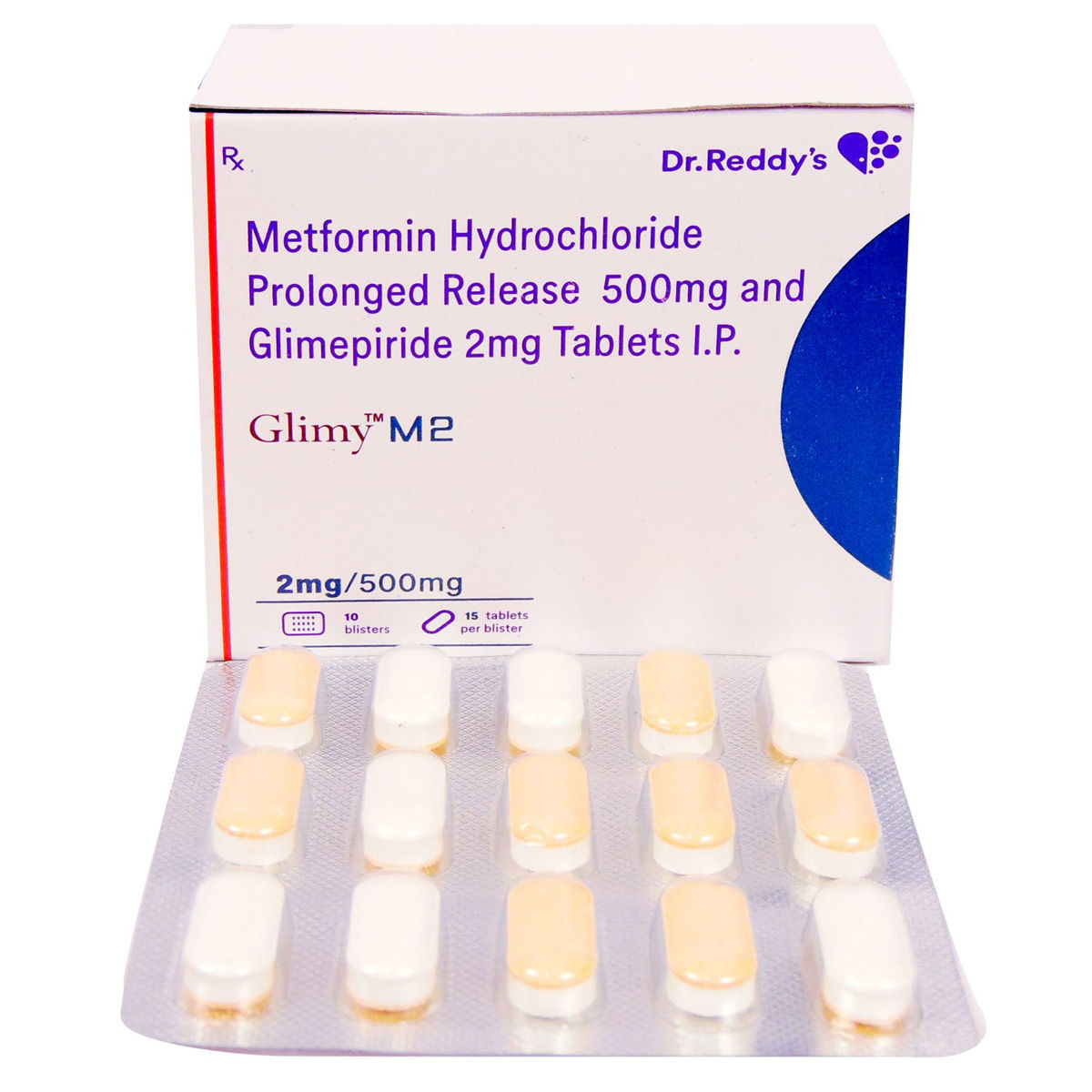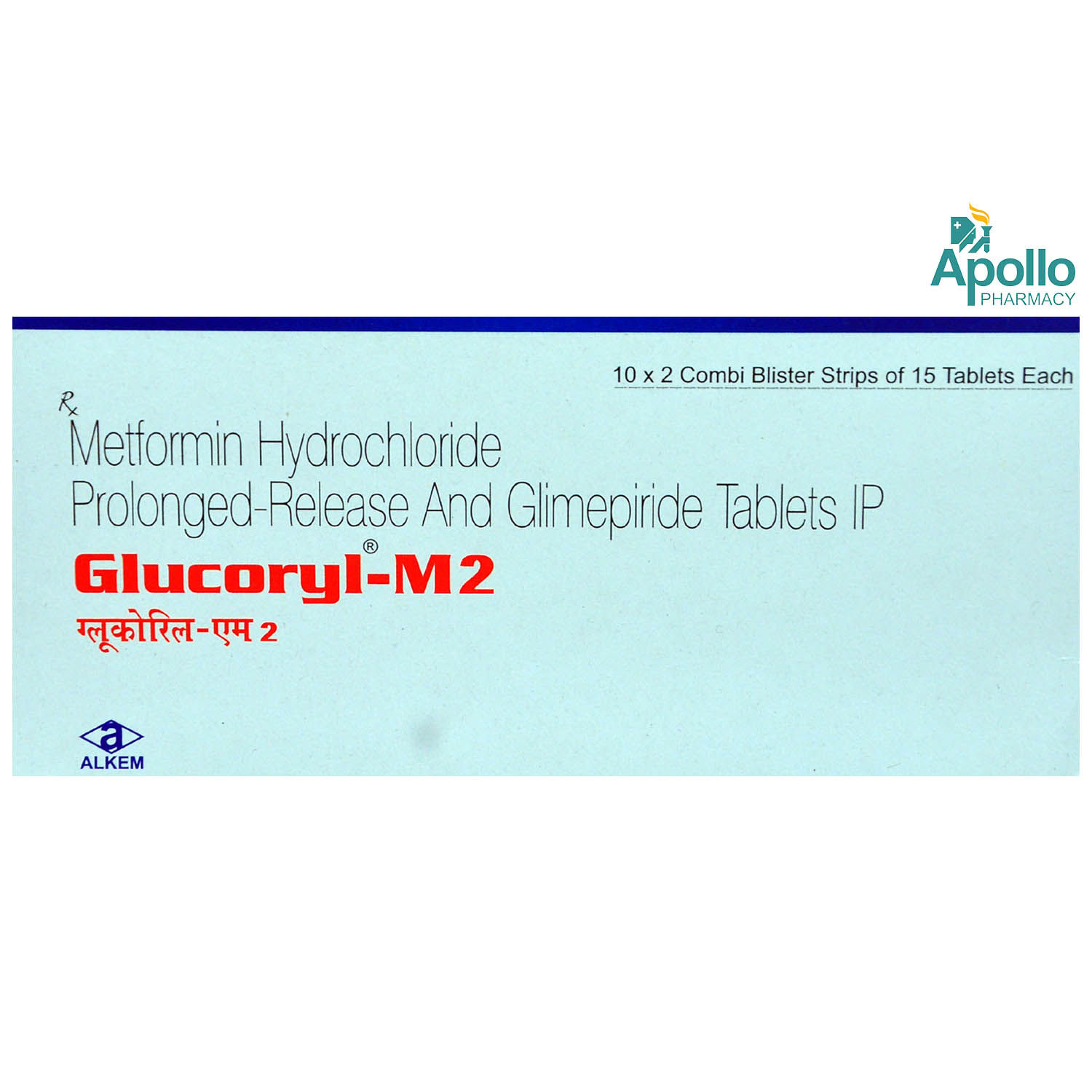Glyciphage-G 2 Tablet 10's
Glyciphage-G 2 Tablet is used to treat type 2 diabetes. It contains Glimepiride and Metformin which works by decreasing the amount of glucose absorbed from the food and the amount of glucose made by the liver. It helps the pancreas to produce insulin and helps the body use insulin efficiently. In some cases, this medicine may cause side effects such as stomach pain, nausea, diarrhoea, vomiting, headache or metallic taste. Inform the doctor if you are pregnant or breastfeeding, taking any other medication, or have any pre-existing medical conditions.
₹110.7*
MRP ₹123
10% off
₹104.55*
MRP ₹123
15% CB
₹18.45 cashback(15%)
Free Delivery
With Circle membership
(Inclusive of all Taxes)
This offer price is valid on orders above ₹800. Apply coupon PHARMA10/PHARMA18 (excluding restricted items)
Know Your Delivery Time
Provide Delivery Location
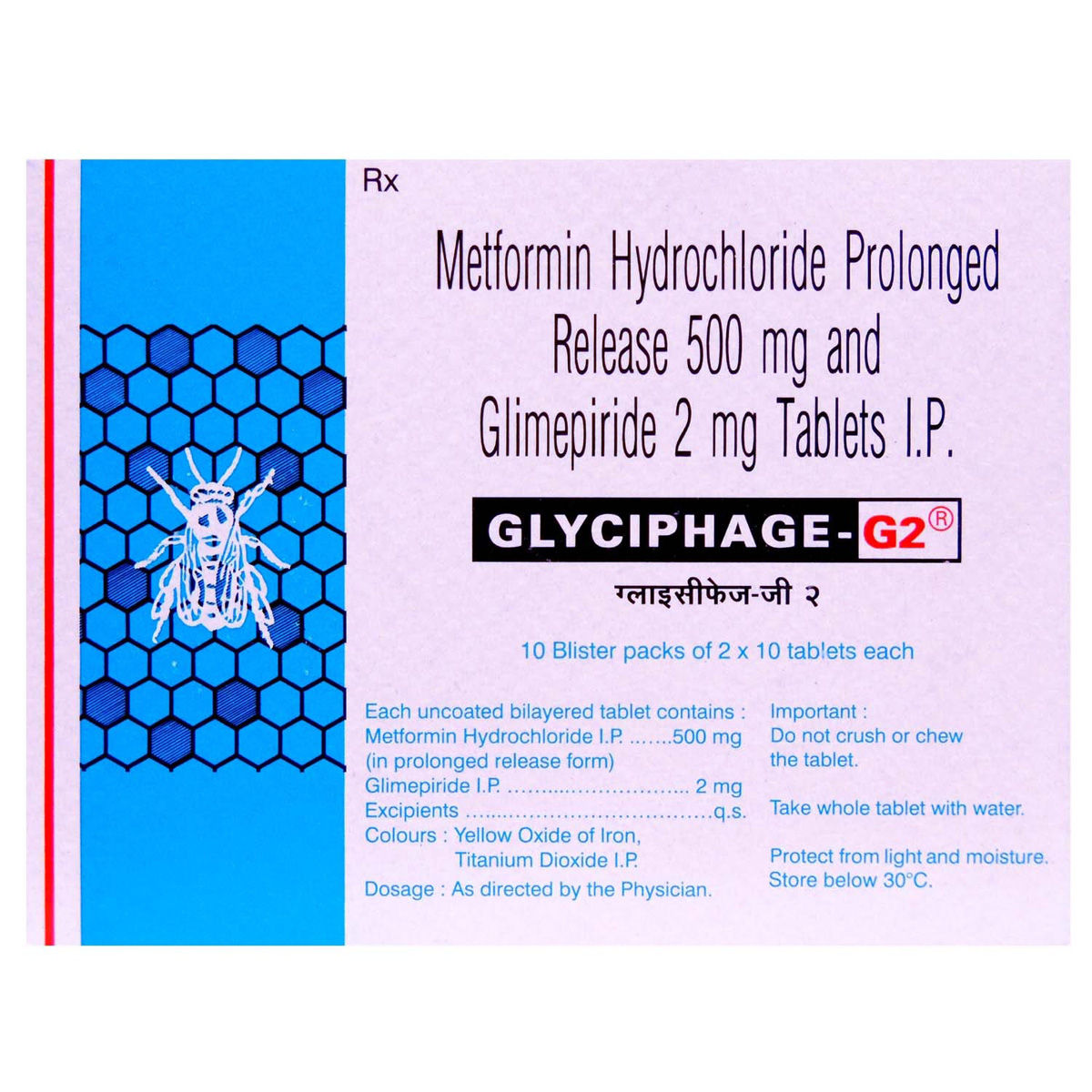
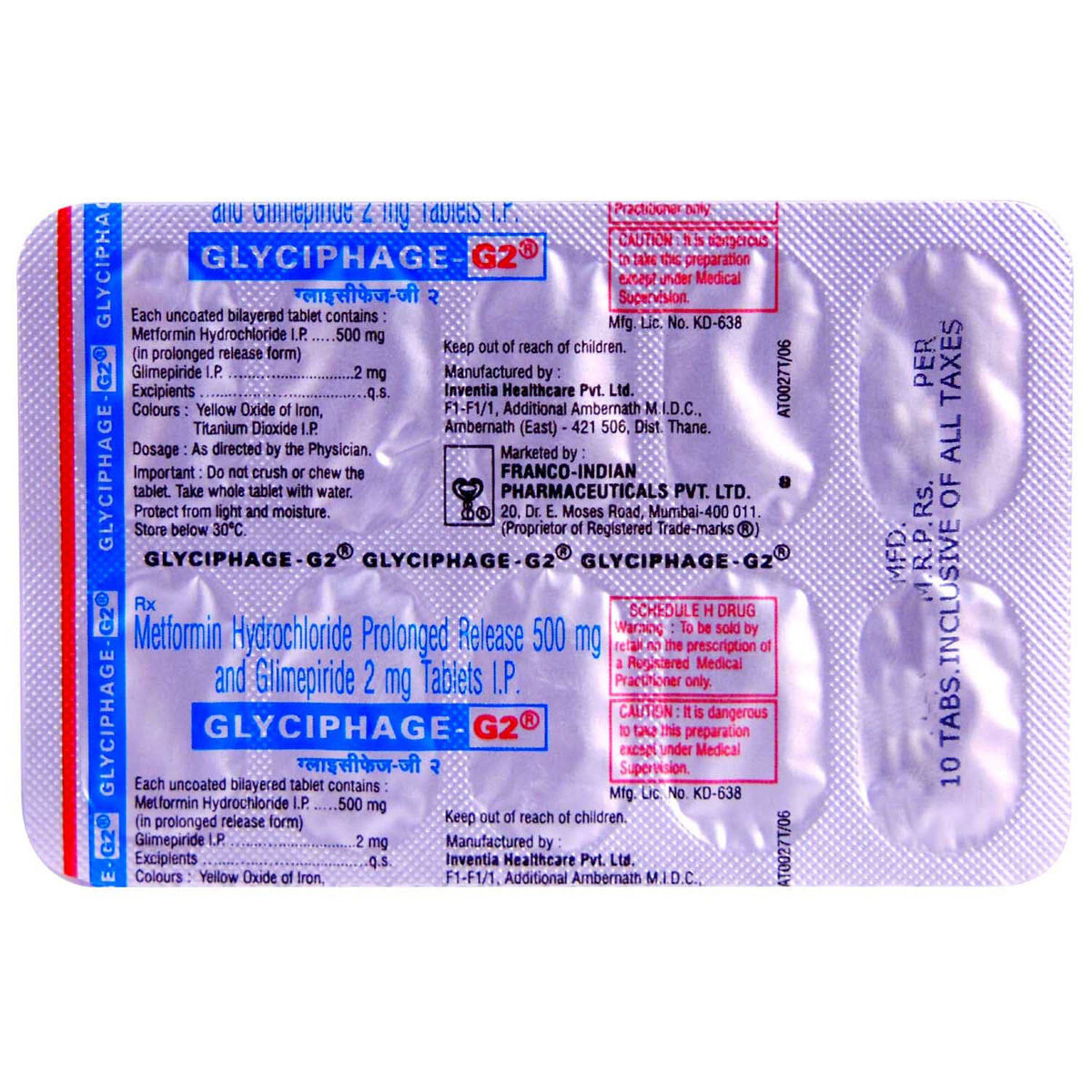
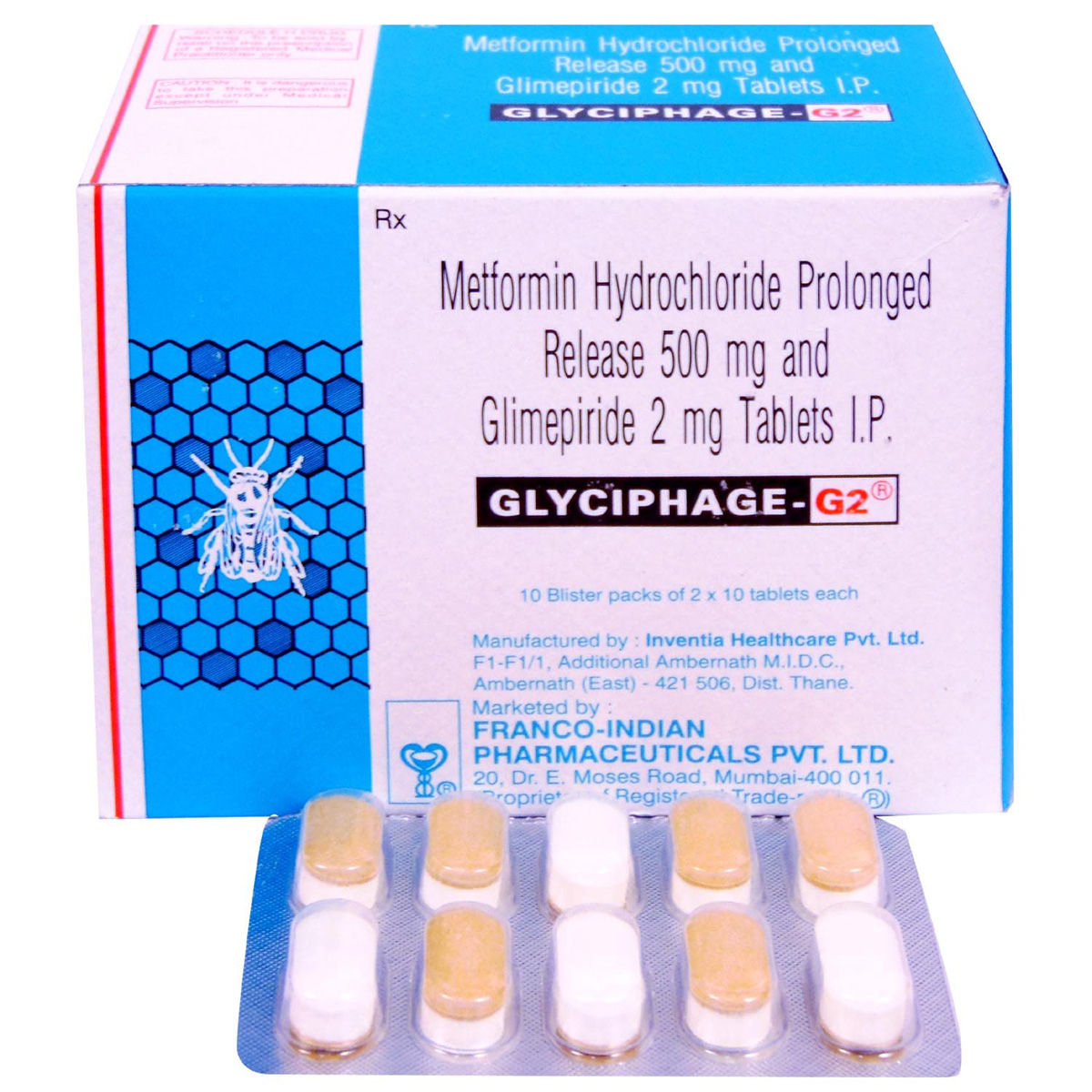
Available Offers
 Prescription drug
Prescription drugWhats That
 77 people bought
77 people bought 
Secure Payment

India's Most Trusted Pharmacy

Genuine Products
Synonym :
Composition :
Manufacturer/Marketer :
Consume Type :
Return Policy :
Expires on or after :
About Glyciphage-G 2 Tablet
Glyciphage-G 2 Tablet belongs to a class of medicines called anti-diabetic drugs used in the treatment of type 2 diabetes, especially in patients whose blood sugar levels are not controlled by diet and exercise alone. Type 2 diabetes is a chronic (long-lasting) condition that affects the way our body processes glucose. People with type 2 diabetes either do not produce enough insulin, or the insulin produced is unable to perform its function in the body (insulin resistance).
Glyciphage-G 2 Tablet is a combination of two antidiabetic drugs, namely: Glimepiride and Metformin. Glimepiride works by stimulating beta cells in the pancreas that produce insulin. Thus, insulin helps to remove sugar from the blood. Metformin works by reducing the sugar production by cells in the liver and delays sugar absorption from the intestines. Also, it increases the sensitivity of muscle cells to insulin, which enables these cells to remove sugar more effectively from the blood.
Take Glyciphage-G 2 Tablet as prescribed by your doctor. You are advised to take Glyciphage-G 2 Tablet for as long as your doctor has prescribed it for you based on your medical condition. In some cases, you may experience stomach pain, nausea, diarrhoea, vomiting, headache or metallic taste. Most of these side effects of Glyciphage-G 2 Tablet do not require medical attention and gradually resolve over time. However, if the side effects persist or worsen, please consult your doctor.
If you are allergic to Glyciphage-G 2 Tablet or any other medicines, please tell your doctor. Glyciphage-G 2 Tablet is not recommended for children. Avoid breastfeeding while taking Glyciphage-G 2 Tablet as it may be excreted in human milk. If you are pregnant or planning for pregnancy, please inform your doctor before taking Glyciphage-G 2 Tablet as it may harm the unborn baby. Avoid alcohol consumption with Glyciphage-G 2 Tablet as it may increase the risk of lactic acidosis (accumulation of lactic acid in the body). Drive only if you are alert after taking Glyciphage-G 2 Tablet . Take short, frequent meals and avoid prolonged fasting while taking Glyciphage-G 2 Tablet .
Uses of Glyciphage-G 2 Tablet
Directions for Use
Medicinal Benefits
Glyciphage-G 2 Tablet contains Glimepiride and Metformin used to treat type 2 diabetes. Glimepiride stimulates cells in the pancreas that produce insulin, which helps remove sugar from the blood. Metformin reduces sugar production by cells in the liver and delays sugar absorption from the intestines. Also, it increases the sensitivity of muscle cells to insulin, which enables these cells to remove sugar more effectively from the blood.
How Glyciphage-G 2 Tablet Works
Storage
Side Effects of Glyciphage-G 2 Tablet
- Stomach pain
- Nausea
- Diarrhoea
- Vomiting
- Headache
- Metallic taste
What if I have taken an overdose of Glyciphage-G 2 Tablet
Drug Warnings
If you are allergic to Glyciphage-G 2 Tablet or any other medicines, please tell your doctor. Glyciphage-G 2 Tablet is not recommended for children. Avoid breastfeeding while taking Glyciphage-G 2 Tablet as it may be excreted in human milk. If you are pregnant or planning for pregnancy, please inform your doctor before taking Glyciphage-G 2 Tablet as it may harm the unborn baby. Avoid alcohol consumption with Glyciphage-G 2 Tablet as it may increase the risk of lactic acidosis (accumulation of lactic acid in the body). Drive only if you are alert after taking Glyciphage-G 2 Tablet . Take short, frequent meals and avoid prolonged fasting while taking Glyciphage-G 2 Tablet . Beware of symptoms of hypoglycemia (low blood sugar), which include sweating, dizziness, palpitations, shivering, intense thirst, dry mouth, dry skin, frequent urination, etc. Whenever you experience any of these symptoms, immediately consume 5-6 candies or 3 glucose biscuits, or 3 teaspoons of honey/sugar, and also consult your doctor. Make sure to carry these with you at all times, especially during long travels.
Drug-Drug Interactions
Drug-Drug Interactions
Login/Sign Up
Co-administration of Iopamidol with Glyciphage-G 2 Tablet 10's can increase the risk of side effects.
How to manage the interaction:
Taking Glyciphage-G 2 Tablet 10's with Iopamidol is not recommended, please consult a doctor before taking it. Do not discontinue the medications without consulting a doctor.
Co-administration of Iohexol with Glyciphage-G 2 Tablet 10's can increase the risk of side effects.
How to manage the interaction:
Taking Glyciphage-G 2 Tablet 10's with Iohexol is generally avoided as it can result in an interaction, please consult your doctor before taking it.
Co-administration of Iopentol with Glyciphage-G 2 Tablet 10's can increase the risk of side effects.
How to manage the interaction:
Taking Glyciphage-G 2 Tablet 10's with Iopentol is not recommended, please consult your doctor before taking it.
Co-administration of Ioglicic acid with Glyciphage-G 2 Tablet 10's can increase the risk of side effects.
How to manage the interaction:
Taking Glyciphage-G 2 Tablet 10's with Ioglicic acid is generally avoided as it can result in an interaction, please consult your doctor before taking it.
Co-administration of Iodixanol with Glyciphage-G 2 Tablet 10's can increase the risk of side effects.
How to manage the interaction:
Taking Glyciphage-G 2 Tablet 10's with Iodixanol is not recommended, please consult a doctor before taking it. Do not discontinue the medications without consulting a doctor.
Co-administration of Glyciphage-G 2 Tablet 10's and Iobitridol can increase the risk of lactic acidosis (when the body produces too much lactic acid).
How to manage the interaction:
Taking Glyciphage-G 2 Tablet 10's with Iobitridol is generally avoided as it can result in an interaction. Please consult your doctor before taking it.
Co-administration of Iotroxic acid with Glyciphage-G 2 Tablet 10's can increase the risk of side effects.
How to manage the interaction:
Taking Glyciphage-G 2 Tablet 10's with Iotroxic acid is not recommended, please consult your doctor before taking it.
Co-administration of Iofendylate with Glyciphage-G 2 Tablet 10's can increase the risk of side effects.
How to manage the interaction:
Taking Glyciphage-G 2 Tablet 10's with Iofendylate is generally avoided as it can result in an interaction, please consult your doctor before taking it.
Co-administration of Glyciphage-G 2 Tablet 10's with Metrizamide together can cause the risk of lactic acidosis (when the body produces too much lactic acid ).
How to manage the interaction:
Taking Glyciphage-G 2 Tablet 10's with Metrizamide is generally avoided as it can possibly result in an interaction, it can be taken if a doctor has advised it. However, if you experience headaches, muscle cramps or pain, contact a doctor immediately. Do not discontinue any medications without consulting a doctor.
Co-administration of Glyciphage-G 2 Tablet 10's and Ioxitalamic acid can increase the risk of lactic acidosis (when the body produces too much lactic acid).
How to manage the interaction:
Taking Glyciphage-G 2 Tablet 10's with Ioxitalamic acid is not recommended, please consult your doctor before taking it.
Drug-Food Interactions
Drug-Food Interactions
Login/Sign Up
Diet & Lifestyle Advise
Do regular exercise such as cycling, walking, jogging, dancing, or swimming for a minimum of 30 minutes per day. Invest at least 150 minutes of your week in exercise.
Maintain healthy body weight as obesity is also related to the onset of diabetes.
Maintain a low-fat and low-sugar diet. Replace carbohydrates-containing foods with whole grains, fruits, and vegetables as carbohydrates turn to sugars leading to high blood sugar.
Avoid consumption of alcohol and quit smoking.
Habit Forming
Therapeutic Class
Glyciphage-G 2 Tablet Substitute

Auglimy M2 Tablet 10's
₹11.40per tabletZoryl M 2 Tablet 20's
by AYUR
₹15.53per tabletGluconorm G 2 Tablet 15's
₹19.02per tabletGlycomet-GP 2 Tablet 15's
₹10.71per tabletGemer 2 Tablet 15's
₹13.86per tablet
Product Substitutes
Alcohol
Unsafe
You are recommended to avoid consumption of alcohol with Glyciphage-G 2 Tablet as it may increase the risk of lactic acidosis (accumulation of lactic acid in the body).
Pregnancy
Unsafe
Glyciphage-G 2 Tablet is not recommended for pregnant women as it may harm the unborn baby. Please consult a doctor if you are pregnant or planning for pregnancy.
Breast Feeding
Unsafe
Avoid breastfeeding while taking Glyciphage-G 2 Tablet as it may be excreted in breastmilk and cause adverse effects in the baby. Therefore, please consult a doctor before using Glyciphage-G 2 Tablet if you are breastfeeding.
Driving
Caution
Glyciphage-G 2 Tablet may decrease alertness in some people. Therefore, drive only if you are alert after taking Glyciphage-G 2 Tablet .
Liver
Caution
Take Glyciphage-G 2 Tablet with caution, especially if you have a history of Liver diseases/conditions. The dose may be adjusted by your doctor as required.
Kidney
Caution
Take Glyciphage-G 2 Tablet with caution, especially if you have a history of Kidney diseases/conditions. The dose may be adjusted by your doctor as required.
Children
Unsafe
Glyciphage-G 2 Tablet is not recommended for children as the safety and effectiveness were not established.
FAQs
Country of origin
Manufacturer/Marketer address
Customers Also Bought
Disclaimer
Author Details
We provide you with authentic, trustworthy and relevant information
Recommended for a 30-day course: 3 Strips






